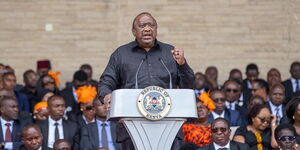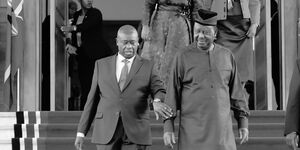Tanzania Deports Activist Boniface Mwangi By Road After Three-Day Detention
Missing activist Boniface Mwangi has been found alive in Ukunda after being detained in Tanzania for more than three days, the family has confirmed.
Prime Cabinet Secretary and Foreign Affairs CS Musalia Mudavadi has also confirmed that the missing activist has been freed through a spokesperson.
Mwangi has been rushed to the hospital for medical review, according to his lawyer, James Wanjeri.
He has been missing since Monday, after he flew to the East African nation to attend the court hearing of opposition figure Tundu Lissu.
Earlier on Thursday, concerns over the activist’s whereabouts nearly escalated into a diplomatic row, with the Kenyan government accusing Tanzanian authorities of withholding information on Mwangi’s status.
The Ministry of Foreign Affairs revealed that Kenya had made multiple unsuccessful attempts to get updates from Tanzanian officials. This comes after Mwangi was detained on Monday morning in Dar es Salaam, reportedly on charges of obstruction and unlawful entry into the country.
"The Ministry notes that, despite several requests, officials of the Government of Kenya have been denied consular access and information to Mr Mwangi. The Ministry is also concerned about his health, overall well-being, and the absence of information regarding his detention," a statement from the ministry read in part.
Following the earlier developments, the Kenyan government stated that it was left with no option but to recall the provisions of the Vienna Convention on Consular Relations (1963), which provide that consular officers shall be free to communicate with nationals of the sending state and to have access to them.
Meanwhile, in Nairobi, hundreds of activists had started trooping into the central business district and to the Tanzanian embassy in Kenya to demand the immediate release of Mwangi.
Heavy police presence was also noticeable, as they were on high alert to avert any case of lawlessness within the areas.
Mwangi was detained alongside Ugandan national Agather Atuhaire shortly after the detention and deportation of former Justice Minister Martha Karua, former Chief Justice Willy Mutunga, Vocal Africa CEO Hussein Khalid, and activist Hanifa Adan at Julius Nyerere International Airport on Sunday and Monday this week.
Former CJ David Maraga had on Thursday morning expressed his concerns over the continued detention by authorities in the United Republic of Tanzania without access to the courts, legal counsel, or consular representation, terming such acts a clear violation of international human rights law.
Mwangi and the family are expected to later address the media regarding the condition of the activist.












